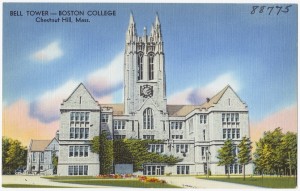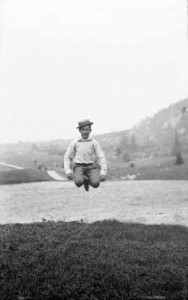Archives, libraries, and special collections all over New England have digitized vast numbers of items from their collections and made them available on the Web. Metadata aggregation is one option for promoting discoverability to a wide audience and some states have (or are working towards having) the technological infrastructure and overseeing agency to host metadata and/or digital content from organizations within their states. What is the current state of these statewide repositories at the beginning of 2014? What are the current issues and challenges faced by the institutions and/or collaborations that are responsible for these systems? What do organizations need to do to be included in these repositories? Could these statewide initiatives collaborate in any areas?
Nancy Heywood, former Digital Commonwealth President and current board member, submitted this concept to New England Archivists (NEA) as a panel session proposal for their 2014 Spring Meeting in Portsmouth, New Hampshire. The proposal was accepted and representatives from all six New England states met on the afternoon of April 22 to discuss each state’s existing or planned state-wide repository in a program titled “The State of Statewide Repositories in New England and How They are Aggregating Special Collections.” Nancy served as moderator and Joseph Fisher, Past President and current board member, represented Digital Commonwealth.
As with Digital Commonwealth in Massachusetts, several other New England states have well-established programs for providing centralized access to their state’s digital collections. The oldest continuous effort belongs to the Maine Historical Society which established their Maine Memory Network in 2001. Connecticut History Online launched that same year by the Connecticut Historical Society, and although the site still persists, their digital collections have moved to a new state-wide repository called the Connecticut Digital Archive (CTDA) that was developed by the University of Connecticut Libraries and came online at the beginning of 2013. As with Digital Commonwealth, the CTDA was built on the open-source Fedora software platform.
In Vermont, the Center for Digital Initiatives began in 2007 as a platform for accessing special collections from the archives at the University of Vermont Libraries. It has since expanded to serve more of a state-wide function.
The New Hampshire Historical Society is currently developing their New Hampshire History Network that is scheduled to launch in September, 2014. Likewise, the Rhode Island Historical Society is developing their Rhode Island History Online Directory Initiative (RHODI) which presently is planned to be a comprehensive directory of archival collections in the state.
Overall, as each panelist conveyed the benefits and challenges of working with various institutions within their states, it was apparent that providing a centralized repository for aggregating digital collections relevant to the state and its history was considered an essential service that every state should provide or at least strive to provide. It was clear that there was genuine excitement, both from the panelists as well as from the 40 or so audience members, about these projects and the significant benefits they offered to everyone involved.
Descriptions of the six projects are available for download in this PDF document.
Besides the fact that Digital Commonwealth is the only state-wide repository in New England harvested by the Digital Public Library of America, the most apparent contrast with the other New England states is that Digital Commonwealth began and still functions as the only volunteer member-based effort rather than one run out of an established institution such as a state historical society or a major public university. In all of those cases, paid staff is involved in management and upkeep and at least one person is usually in charge on a full-time basis. Until the recent partnership with the Boston Public Library, Digital Commonwealth lacked that support from dedicated paid staff. Fortunately the BPL now provides technical-support needs, and as of three weeks ago Digital Commonwealth hired its first part-time employee to help manage the fiscal and membership side of the organization. That still leaves a large amount of work for the board of directors and other volunteers to do – outreach and planning, organizing events, producing newsletters and blog posts, updating the website – tasks required to keep the organization active, informed, and moving forward.
The pressing question for Digital Commonwealth is if it can continue as a volunteer-driven organization or if, like the other New England states, it will necessarily gravitate toward a more fully institutional-based entity. Ultimately that is up to the members and their willingness to get involved and help by volunteering some of their time on a regular basis.
Compared to the other efforts in New England, especially due to its volunteer management, the success of Digital Commonwealth is very impressive. Yet it must be acknowledged that the biggest evidence of success – the use of Fedora, the partnership with the DPLA, the steadily expanding membership – is due to the collaboration with the BPL and their achievements to secure an LSTA grant, solicit funds from the state legislature, and hire a team of expert personnel. Yet it is also true that the member volunteers kept a great organization alive for the BPL to assist in making considerably better. Hopefully this unique experiment of active member management partnering with large institutional assistance can continue, because undoubtedly it makes for a stronger and more vibrant entity than either side working on its own.
— Joseph Fisher (Past President of Digital Commonwealth and acting Treasurer)


